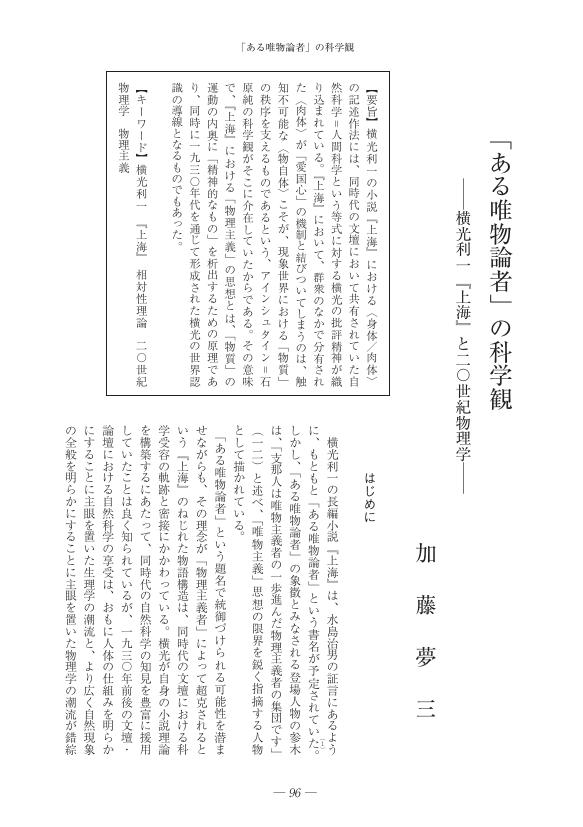5 0 0 0 OA 探偵小説の条件 ―小酒井不木と平林初之輔の「科学」観―
- 著者
- 加藤 夢三
- 出版者
- 全国大学国語国文学会
- 雑誌
- 文学・語学 (ISSN:05251850)
- 巻号頁・発行日
- vol.233, pp.25-37, 2021 (Released:2022-12-30)
3 0 0 0 探偵小説の条件 : 小酒井不木と平林初之輔の「科学」観
- 著者
- 加藤 夢三
- 出版者
- 全国大学国語国文学会 ; 1976-
- 雑誌
- 文学・語学 (ISSN:05251850)
- 巻号頁・発行日
- no.233, pp.25-37, 2021-12
2 0 0 0 OA 1930年代日本における科学者の論壇進出と戸坂潤の「文藝学」構想
- 著者
- 加藤 夢三
- 出版者
- 日本科学史学会
- 雑誌
- 科学史研究 (ISSN:21887535)
- 巻号頁・発行日
- vol.61, no.303, pp.199-214, 2022 (Released:2023-11-17)
1930 年代、それまで専門知の探究に力を注いでいた職業科学者たちが、同時代論壇への参入を通じて社会参画の意思を志すようになった。この動きは、高尚な人格と洞察能力を持つ総合的知識人としての科学者像を確立する一方で、結果的に科学振興を目論む統治権力に迎合する側面を持つものでもあった。戸坂潤の批評活動は、こうした科学者と統治権力の協働関係に向けられたものとして理解できる。科学者による公共意識の高まりが、批判精神を欠いたままに帝国日本への国策貢献と接続してしまう事態に対して、戸坂は警鐘を鳴らしていた。このような共犯関係を回避するためには、公共的な有用性とは異なる個別具体的な視点を持つことが重要であり、ゆえに巷間の科学者に「文学」に携わることを積極的に奨励していた。戸坂は「文学」の解釈・吟味を通じて認識論的な思索を深める企てを「文藝学」と呼び、そこに時局の政治力学とは異なる知的対話の契機を探ろうとしていた。
2 0 0 0 OA 現勢する倫理、潜勢する論理 -舞城王太郎『ディスコ探偵水曜日』論-
- 著者
- 加藤 夢三
- 出版者
- 早稲田大学大学院教育学研究科千葉・金井・石原・和田研究室
- 雑誌
- 近代文学研究と資料. 第二次
- 巻号頁・発行日
- vol.9, pp.241-259, 2015-03-10
2 0 0 0 OA 石原純の自然科学的世界像と昭和初期文壇への影響
- 著者
- 加藤 夢三
- 出版者
- 日本科学史学会
- 雑誌
- 科学史研究 (ISSN:21887535)
- 巻号頁・発行日
- vol.56, no.284, pp.2, 2018 (Released:2021-01-14)
Jun Ishiwara was a leading Japanese physicist,but he was also a renowned poet in the early Showa era. Previous studies of Ishiwara rarely linked his literary career with his work as a physicist.The aim of this paper is to demonstrate that his theoretical framework of“reality”was rooted in both science and literature. When Ishiwara introduced Einsteinʼs theory of relativity and quantum mechanics to other writers of his time,he claimed that the development of theoretical physics dismantled so-called orderly reality. According to Ishiwara,if we apply the principles of modern physics to the actual world,we have to understand reality based on“theory”and“law”instead of experience. Therefore,in his literary work,Ishiwara emphasized the“reality”in the former sense of the word: one must extract it from experiences by integrating them into a theoretical framework.As a poet,Ishiwara not only brought“super-materialism”to literature and established“New Tanka theory”,but also contributed to a new way of recognizing the world. His view of the world attracted and influenced many literary figures in the early Showa era such as Riichi Yokomitsu and Yoichi Nakagawa. Ishiwara's interdisciplinary spirit is still present in contemporary literature.(or Ishiwaraʼs interdisciplinarity also offers a fertile ground for constructive dialogue between literature studies and historical studies of science that otherwise rarely interact with one another in the current scholarship).
1 0 0 0 OA 研究展望 フィクション論と文学研究の交点
- 著者
- 加藤 夢三
- 出版者
- 昭和文学会
- 雑誌
- 昭和文学研究 (ISSN:03883884)
- 巻号頁・発行日
- vol.82, pp.141-143, 2021 (Released:2022-11-17)
1 0 0 0 OA ジャンル意識の政治学 昭和初期「科学小説」論の変転と帰趨
- 著者
- 加藤 夢三
- 出版者
- 昭和文学会
- 雑誌
- 昭和文学研究 (ISSN:03883884)
- 巻号頁・発行日
- vol.78, pp.111-125, 2019 (Released:2021-07-01)
1 0 0 0 OA 「ある唯物論者」の科学観 横光利一『上海』と二〇世紀物理学
- 著者
- 加藤 夢三
- 出版者
- 昭和文学会
- 雑誌
- 昭和文学研究 (ISSN:03883884)
- 巻号頁・発行日
- vol.75, pp.96-110, 2017 (Released:2022-07-01)
1 0 0 0 OA 昭和初期文壇における理論物理学の受容と展開
1 0 0 0 「科学的精神」の修辞学 : 一九三〇年代論壇の「科学」ヘゲモニー
- 著者
- 加藤 夢三
- 出版者
- 日本近代文学会
- 雑誌
- 日本近代文学 = Modern Japanese literary studies (ISSN:05493749)
- 巻号頁・発行日
- vol.98, pp.194-209, 2018-05

